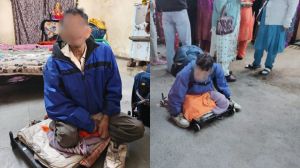Shifting Centre
RAJ Bhawans are usually meant for pensioners, but there are times when the party in power in Delhi wants them active. The way the Congress w...

RAJ Bhawans are usually meant for pensioners, but there are times when the party in power in Delhi wants them active. The way the Congress wanted Buta Singh to be in Bihar.
As head of the state under central rule, Buta Singh was expected to improve governance8212;for no altruistic reasons but for rescuing his sinking party. Active, he has been. A detached pensioner, certainly not. JDU leader Nitish Kumar represents the public sentiment on five months of Buta rule in Bihar. 8216;8216;Criticising Laloo8217;s misrule, we used to constantly demand President8217;s rule in Bihar. After seeing the President8217;s rule, we shall never again ask for it.8217;8217;
The thin middle class in Bihar perennially hoped that their salvation from Laloo rule would come in the form of President8217;s rule; they imagined it would set Bihar right. When Bihar was placed under central rule on March 7, there was more relief than outrage. Hopes waned soon; despair set in. A local newspaper ran a headline last month8212;Buta Hein, Loota Hein, Jhoota Hein8212;Buta is a looter and a liar.
When Buta took over Bihar, optimists thought his rich administrative experience would help improve the state that had become ungovernable. The 71-year-old was elected to the Lok Sabha as early as 1962 and since then has handled as union minister, portfolios as wideranging as shipping, transport, parliamentary affairs, home affairs. As an astute politician close to the late Indira Gandhi, he made a base for himself in Rajasthan which continuously elected him to the Lok Sabha.
BUT sceptics had predicted Buta would make a mess. Bihar has a tendency to prove pessimists right, and Buta is their latest glee. 8216;8216;If the Buta rule goes on for a while, Bihar will equate Laloo to the Great Akbar or Ashoka,8217;8217; says a bureaucrat.
Calls claiming to be on behalf of Lovely or Sweety, the nicknames of the governor8217;s sons, are frequent to the state8217;s bureaucrats. Some requesting favours, some offering postings at a price. There is no way to verify these calls, but what is now clear is that the governor personally made the reshuffle in civil and police administration this week, without even consulting the state8217;s chief secretary. Earlier, the crucial post of Patna DM lay vacant for nearly two months, for unexplained reasons. A side-lined and frustrated chief secretary, G S Kang, proceeded on leave in protest.
Except marginally pushing some Dalit politics in bureaucratic postings, politics in hardly on the agenda of Singh, least of all, his own party8217;s. Congressmen in the state have turned against him and allege his actions are bolstering Laloo8217;s politics. Raj Bhawan in Patna did not become a nerve centre for Congress revival strategies; nor did it bother to accommodate the diverse groups and caste interests in the party. Buta Singh merely confined his agenda to the bare minimum8212;to protect his personal interests, accommodating Laloo to sustain it.
Change in Bihar post-Laloo has been for the worse. The same government officials, teachers and doctors continue to be as unaccountable as they always have been. Crime and corruption have only soared under Buta.
Arun Pathak, a former Laloo loyalist, is the special advisor to the governor and the duo are not in a hurry to change anything. Far from trying to attempt improvement, the active complicity of the state administration is apparent in the last round of official transfers. Punishing the best and rewarding the corrupt, the signal is clear.
After President8217;s rule, can chaotic Bihar now demand UN rule?
- 01
- 02
- 03
- 04
- 05































